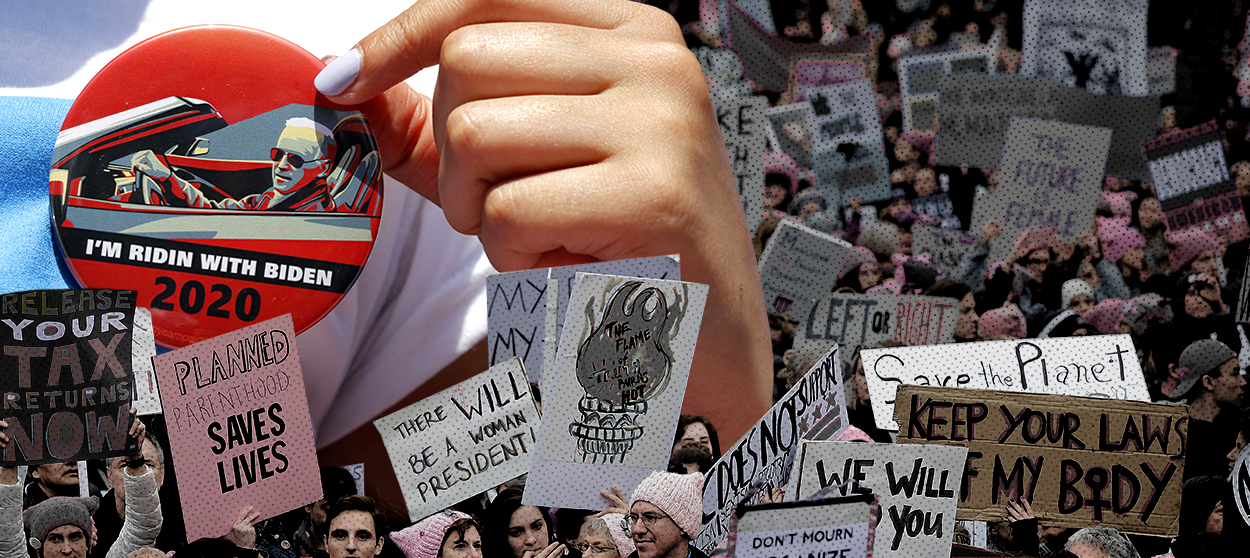Why female rage won't deliver a female president
The great blooming of "women's anger" seems to be withering on the stem


A free daily email with the biggest news stories of the day – and the best features from TheWeek.com
You are now subscribed
Your newsletter sign-up was successful
If we believed the print headlines and TV chyrons, 2019 was going to be another "year of the woman." The afterglow of the midterm elections was a nuclear wash of "women's anger" — a deep-seated sense of fear, grief, and, of course, rage at the boorishness of a groper-in-chief and a GOP majority that made Fury Road's War Boys seem like paragons of chivalry. This rage pushed out of the hard earth and, with it, brought record numbers of women into office, made a woman the speaker of the House, and sparked talk that maybe, just maybe, this country could finally be ready for a woman president. Sure enough, some of the first major announcements of the 2020 electoral cycle came from women — Sens. Elizabeth Warren (Mass.), Kamala Harris (Calif.), Kirsten Gillibrand (N.Y.), Amy Klobuchar (Minn.), and Rep. Tulsi Gabbard (Hawaii) — and for a moment, it seemed as if the future might, in fact, be female. But that moment has proven to be fleeting.
The nurturing spotlight that helps to grow a frontrunner now shines in abundance on the men — especially "the Bs" of Joe Biden, Bernie Sanders, Beto O'Rourke, and Pete Buttigieg — who are ballyhooed as being, respectively, more stately and "electable;" more prescient in their policy; more charismatic; and more wonkish, but, like, in a sexy appealing way. The truths about each of these men's merits and accomplishments — especially in relation to the women they're running against (all of whom haven't yet lost a major election) — remains eminently debatable. The more pressing — and distressing — question is how the "year of the woman" became a calendar spread of ever-increasing, ever-indistinguishable white dudes. The great blooming of "women's anger" — though it is the root of the organizing and advocacy of #TheResistance and yielded big fruit in the midterms — seems to be withering on the stem.
How can this be?
The Week
Escape your echo chamber. Get the facts behind the news, plus analysis from multiple perspectives.

Sign up for The Week's Free Newsletters
From our morning news briefing to a weekly Good News Newsletter, get the best of The Week delivered directly to your inbox.
From our morning news briefing to a weekly Good News Newsletter, get the best of The Week delivered directly to your inbox.
Firstly, there seems to be a palpable difference in how voters view women running for legislative offices vs. women running for executive offices. This tracks with what Democratic media strategist Danny Barefoot has observed. "The lower the rung of power you get, the more comfortable voters are with women in positions of power," he tells The Week. "I don't think people view their Congress person as the most important person in the world; it's not an executive position. But then you start getting into really high-level offices, and I think you see this in governor races as well, where folks are just a little bit more hesitant."
That smacks of sexism, and indeed, Barefoot says he sees internalized misogyny as a huge factor in the electability question (after all, the majority of white women voted for Trump): "It's not just men, everybody holds women to a different standard," he says. "Men obviously first and foremost, and also the press, and it's also women voters hold women to higher standards — that is the most insidious thing about sexism."
But Erin C. Cassese, an associate professor of political science at the University of Delaware, says this phenomenon can't be reduced purely to voters' gender bias. Instead, it may be that Democratic voters are still smarting from Hillary Clinton's electoral apocalypse of 2016. They're just not sure a woman can beat President Trump. "There's a sense of risk-aversion among some Democrats and this is translating into some uncertainty about the viability of women candidates for this specific office," Cassese says. "A lot of things go into that risk calculus — some of it is questions about women's leadership capabilities, who will be able to gain ground in the Midwest, some of it is real attraction to these particular male candidates."
There's no doubt that Clinton is a complex specter hovering over 2020, a wronged woman in need of avenging but also a Ghost of Electoral Cycles Past. Many women channeled their grief over Clinton's loss into the resistance (it's worth noting that the Women's March remains the largest single-day protest in American history) and electing a record number of women to the House of Representatives and state and local governments. But "some of the novelty of female presidential candidates that attracts media coverage may have a detrimental effect on this year's women candidates," says Jennifer Lucas, PhD, a professor of politics at Saint Anselm College.
A free daily email with the biggest news stories of the day – and the best features from TheWeek.com
It's easy, and certainly not entirely incorrect, to place some of the blame for the shifting tide on the mass media. After all, the media, along with pundits and the Twitterati, have positioned Biden as the inevitable frontrunner, are already anticipating O'Rourke's campaign "reboot," and proclaiming that Trump's dumb nickname for Buttigieg means that the South Bend mayor is a true contender now. Meanwhile, the female candidates are getting a more cold assessment: Kamala Harris is a "cop;" Klobuchar is an "angry boss;" Gillibrand "destroyed Al Franken;" and Warren will forever remain "Pocahontas," perpetually susceptible to Trumpian smearing.
"Historically, female candidates have been more likely to be portrayed as less viable candidates than their male counterparts and received less coverage," Lucas explains. Of course, portraying women candidates as innately less viable has the not-so-subtle effect of making them actually less viable, which, in turn, justifies the desert of coverage. It also discourages fundraising and support, and reaffirms the notion that even a woman who is, on paper, amply qualified to be president, can't actually win the presidency. It is a vicious cycle.
Still, Barefoot questions whether the prevalent narrative about "electability" and America's readiness for a woman president has real currency on the ground, given that Clinton was among the top popular vote winners in recent history (though she did, of course, fall short in the Electoral College). He also finds this narrative strange given the seismic shifts in party demographics, shifts that may have started off gradually, but finally broke apart with the violence of an earthquake in 2016. "White men are moving further and further from the Democratic Party," he says. "I just think they are not a part of our coalition." Women are a crucial part of that coalition: Despite what some politicos may proclaim about the collegiate Bernie Bros, the true base of the Democratic Party is women of color. And there is some evidence that suburban white women, formerly GOP stalwarts, are trickling out of their party.
Whether that malaise translates into a willingness to support a woman candidate for the highest office in the land has yet to be seen — and this current slog of a cycle hasn't augured positively so far. That doesn't mean that there's no room for hope, though. Elizabeth Warren has found a way to meme-ify and commodify her formidable preparedness, turning "I've got a plan for that" into a campaign slogan that rubs its thumb in the eye of the same criticisms that helped to doom Clinton. She began gaining ground on Sanders in the polls after she offered a full-throated call for impeachment. Kamala Harris' masterful filleting of Attorney General William Barr during a Senate Judiciary hearing drew the spotlight — and a reassessment of whether maybe a "cop" might not be the best foe for a profoundly criminal president. There's also reasonable expectation that the ceaseless glut of white guys (at least, the ones not named Joe Biden) will begin to cannibalize each other. It's very early in what will be a very brutal electoral cycle — nonetheless, hope for a potential Madame President persists.
Laura Bogart is a featured writer for Salon and a regular contributor to DAME magazine. Her work has appeared in The Atlantic, CityLab, The Guardian, SPIN, Complex, IndieWire, GOOD, and Refinery29, among other publications. Her first novel, Don't You Know That I Love You?, is forthcoming from Dzanc.
-
 A dreamy long weekend on the Amalfi Coast
A dreamy long weekend on the Amalfi CoastThe Week Recommends History, pasta, scenic views – this sun-drenched stretch of Italy’s southern coast has it all
-
 Can foster care overhaul stop ‘exodus’ of carers?
Can foster care overhaul stop ‘exodus’ of carers?Today’s Big Question Government announces plans to modernise ‘broken’ system and recruit more carers, but fostering remains unevenly paid and highly stressful
-
 6 exquisite homes with vast acreage
6 exquisite homes with vast acreageFeature Featuring an off-the-grid contemporary home in New Mexico and lakefront farmhouse in Massachusetts
-
 The billionaires’ wealth tax: a catastrophe for California?
The billionaires’ wealth tax: a catastrophe for California?Talking Point Peter Thiel and Larry Page preparing to change state residency
-
 Bari Weiss’ ‘60 Minutes’ scandal is about more than one report
Bari Weiss’ ‘60 Minutes’ scandal is about more than one reportIN THE SPOTLIGHT By blocking an approved segment on a controversial prison holding US deportees in El Salvador, the editor-in-chief of CBS News has become the main story
-
 Has Zohran Mamdani shown the Democrats how to win again?
Has Zohran Mamdani shown the Democrats how to win again?Today’s Big Question New York City mayoral election touted as victory for left-wing populists but moderate centrist wins elsewhere present more complex path for Democratic Party
-
 Millions turn out for anti-Trump ‘No Kings’ rallies
Millions turn out for anti-Trump ‘No Kings’ ralliesSpeed Read An estimated 7 million people participated, 2 million more than at the first ‘No Kings’ protest in June
-
 Ghislaine Maxwell: angling for a Trump pardon
Ghislaine Maxwell: angling for a Trump pardonTalking Point Convicted sex trafficker's testimony could shed new light on president's links to Jeffrey Epstein
-
 The last words and final moments of 40 presidents
The last words and final moments of 40 presidentsThe Explainer Some are eloquent quotes worthy of the holders of the highest office in the nation, and others... aren't
-
 The JFK files: the truth at last?
The JFK files: the truth at last?In The Spotlight More than 64,000 previously classified documents relating the 1963 assassination of John F. Kennedy have been released by the Trump administration
-
 'Seriously, not literally': how should the world take Donald Trump?
'Seriously, not literally': how should the world take Donald Trump?Today's big question White House rhetoric and reality look likely to become increasingly blurred
